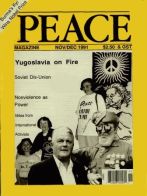
Peace Magazine Nov-Dec 1991, page 29. Some rights reserved.
Search for other articles by Alan Silverman here
Anatol Rapoport and Anthony Rapoport University of Toronto Press, 1991,150 pp Reviewed by Alan Silverman
This provocative little booklet is the result of a collective effort by some members of the Group or 78, a high powered NGO which does research and analysis on Canada's role in the world. It is what I would call a realistically utopian thinkpiece.
The Rapoports feel that the revolutionary changes in the former Soviet Union and Eastern Europe have ushered in a new phase in world history and that it is now time to analyze the key global issues and the role that Canada should play in this new international environment.
The authors claim that there are three paramount threats to the world community. The first is the existence of thousands of nuclear weapons along with the "conceptual inertia" of deterrence theory which rationalizes their production and possible use. This they cutely call "the threat of an end with a bang." The second is "the threat of an end with a whimper," which refers to the population explosion, the despoliation and degradation of water, land, plant, animal, and atmospheric resources. Here is a 20-page primer on the sorry state of humanity's treatment of nature, and although we have heard most of this before...can it really be repeated too often?
The third issue highlighted by the authors is the threat of perpetual violence. They say it finds its origins in the developed countries' ambition to retain their dominance in world affairs by military means if necessary; in the third world elites who refuse to relinquish their privileges; and in the potentially explosive nature of environmental is-sues.
The second half of the booklet is a prescriptive outline of a new foreign and defence policy for Canada. The authors cover controversial territory, such as Canada's relations with the U.S., the Third World, Europe, the OAS and NATO. For each area there is a concrete policy suggestion-one usually quite distinct from the present Tory agenda. The Rapoports realize that such a radical shift in Canadian policy would have domestic repercussions and they do not hesitate to add their views on economic conversion, peace education, and the priorities of Canadian society.
All of this seems like quite a mouthful for just 150 pages. And it is. It makes you chew.
I HAD ONE beef, though. I believe it is incumbent upon the authors to attempt to wrestle with the equally difficult issue of how to achieve the changes they call for. What is the road to the alternative future? Mass mobilization? Elite mobilization? How? Radical social change in the Western world is a mysterious business these days. I hope the authors' next booklet will be entitled, "Some New Ideas On How To Get From A to Z"
Alan Silverman is a political scientist living in Toronto.

Peace Magazine Nov-Dec 1991, page 29. Some rights reserved.
Search for other articles by Alan Silverman here